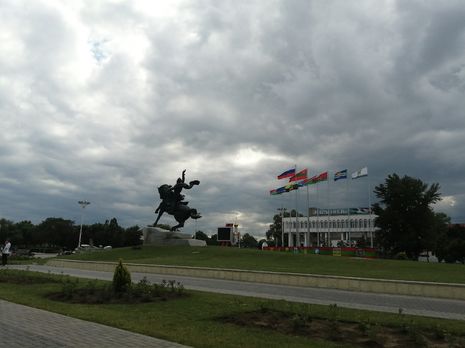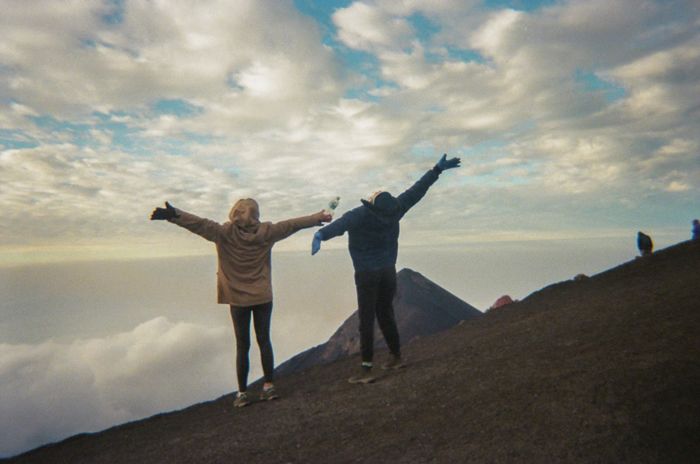My year abroad in a country that doesn’t exist
In the midst of closed borders and lockdowns, Shaun Foster found himself in Transnistria, a country that isn’t recognised as one. He reflects on this life-changing trip and letting go of expectations and the norm

In April of this year, I had been teaching English for almost three months in a language school in Ukraine. My visa-free stay was running out. I was taking online Russian lessons with Yaroslavl State University in Russia, but the ban on British visitors to the country had just been extended, again. I needed to find another Russian-speaking country where I could continue my Year Abroad.
That’s when I remembered Transnistria. The Somerset-sized breakaway state sandwiched between Ukraine and Moldova along the Dniester River. I knew the people there spoke Russian, but I couldn’t just go there, to an unrecognised republic, a frozen war zone…
First, I needed a job. I found a SMART language centre in the capital Tiraspol, and contacted them, asking if they needed a native English speaker. Within a few hours, they’d got back and invited me for an interview.
“In a post-Brexit world, this fact technically makes Transnistria the only place in Europe besides the UK and Ireland where a Brit can work without a visa”
But what about visas? I contacted the foreign ministry of Transnistria, and only had to wait a few days for possibly the most surprising response of my life: “According to the constitution and the current laws of the Pridnestrovian Moldavian Republic, foreign citizens can exercise their right to work on a level with citizens of Transnistria.”
In a post-Brexit world, this fact technically makes Transnistria the only place in Europe besides the UK and Ireland where a Brit can work without a visa.
What’s more, Transnistria, for the first time since the beginning of the pandemic, was opening its borders, for Easter. There’s no limit on length of stay in Transnistria: you can just extend your registration every 45 days, in theory indefinitely. Moreover, there was no requirement for any tests, any quarantine; all I needed to do was catch one train and one bus and I’d be there.
Four days later, at the border, I was questioned about my visit by a guard wearing a uniform emblazoned with the letters КГБ (‘KGB’), the name still used for the Transnistrian border force. The guard’s passport scanner wasn’t working. She shouted over to her colleague in the booth opposite: “Can you scan this young man’s passport! He’s from England! He’s here to teach English! In our country!”
This very much set the tone for the rest of my stay. Nobody failed to see the irony. A Brit moving to Transnistria?! You speak to any young person in Tiraspol, they are trying to get away. Some to Germany or Poland; others to America or Canada; more still to Russia. The way they see it, there are no opportunities in Transnistria.
And yet for me, Transnistria represented opportunity… Where else could I practice my Russian, while legally earning, living cheaply, and without any need for tests or visas?
“I don’t think I’m exaggerating when I say that Transnistria changed me”
Not that it was all picture-perfect. Foreign credit and debit cards don’t work in Transnistria, and so I did everything in cash. For the first couple of months of my stay, when I needed money, I had to cross over to Moldova, showing my passport at the border, take out Lei, and then once back in Tiraspol convert them into the local currency, the Transnistrian rouble, which officially is about as recognised as the country itself.
Nor could I use my phone. Foreign SIM cards don’t work in Transnistria, and the republic has its own telecommunications company, IDC (Interdnestrcom), which is — like Agroprombank bank, the KVINT cognac factory, nearly all the supermarkets, multiple restaurants, and, of course, the capital’s stadium and football team — owned by the company Sheriff. IDC SIM cards aren’t compatible with most foreign phones, and in order to get one they have to take in your phone for a week or two for ‘testing’. Not particularly keen on that idea, I contented myself to using WhatsApp and Wi-Fi.
But what did I actually do with my time there, besides work? When I first arrived, I found a society called DOZA, with whom I’d do something most weeks: from volleyball in the park, to board game nights at someone’s house, to watching Spirited Away on a projector on an abandoned rooftop in Bendery. Through a weekly English-speaking club, I met people with whom to have barbecues, or go to the country’s only zoo; one night a group of us ended up back at these two Danish tourists’ flat, singing songs and sampling the local wine. I went on an early-morning kayak trip to watch the sunrise over the reservoir shared with Ukraine and visited the republic’s beautiful national park in Yagorlyk. I took trips to the vibrant Moldovan capital Chisinau and to the other autonomous region within Moldova, the Turkic region of Gagauzia.
I don’t think I’m exaggerating when I say that Transnistria changed me. As with most places in Eastern Europe, you have to be assertive to be heard. Learning to give one-word requests, or shout «На остановке» (“At the next stop!”) from the back of the bus, certainly knocked some of the British out of me.
But there was something else about Transnistria. A lot of the time I was there felt like a dream. I couldn’t believe I was really living in this country that didn’t even exist. I think I’d be far too nervous to appear on a British morning talk show, and yet I didn’t give it a second thought when I was asked to interview on ‘Good Morning Transnistria’. I often lack confidence in my foreign language skills, but was happy to translate for the EU delegation to Moldova a speech given by the conductor of the Moldovan Youth Orchestra after a concert in Bendery Fortress.
I won’t pretend I didn’t spend a lot of time in Transnistria doing nothing, but the experience did teach me to take opportunities as they come, and also not to obsess about the “what if?” Had this been a normal year, I would have gone to Russia and studied for five months in person. Which would have been great. But I would never have discovered Transnistria.
 Features / Are you more yourself at Cambridge or away from it? 27 January 2026
Features / Are you more yourself at Cambridge or away from it? 27 January 2026 Interviews / Lord Leggatt on becoming a Supreme Court Justice21 January 2026
Interviews / Lord Leggatt on becoming a Supreme Court Justice21 January 2026 News / Reform candidate retracts claim of being Cambridge alum 26 January 2026
News / Reform candidate retracts claim of being Cambridge alum 26 January 2026 News / Vigil held for tenth anniversary of PhD student’s death28 January 2026
News / Vigil held for tenth anniversary of PhD student’s death28 January 2026 News / Stand Up To Racism protests in solidarity with Minneapolis marches28 January 2026
News / Stand Up To Racism protests in solidarity with Minneapolis marches28 January 2026










